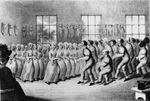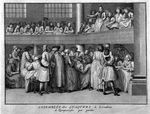Oatmeal 101
Here We Go...
Did you know that Quaker Oatmeal was named after the Quakers themselves? At the time the company began, the biggest company around was Mother's Oatmeal. Who could you trust more than your mother? Someone suggested Quakers, because the literal translation is someone you can trust.
During the Civil War, Quakers made up the majority of all war-protestors. Once it came to slavery, though, The Society of Friends made their biggest complaint. Slavery went against the grain of all Quaker moral fibers. If a flagrant disregard of the war it created was enough, then surely the fact that not all humans were being treated as equally as they were created Put hammer to nail.
What were the Quakers really thinking? What did they have against war? How did they fix it? Let's find out, shall we?
The Quakers
Quakers, formally called the Society of Friends, Have simple enough beliefs; No war, no oaths. As George Fox wrote in The Declaration to the King, "We utterly deny all outward wars and strife and fighting with all outward weapons under any end or to any pretence whatsoever; This is our Testimony to the whole world..." The Quaker meeting, too, is fairly simple. In the past, they segregated women from men. Mind, that was the past. The Society of Friends believed in recieving "Inner Light," in other words the inspiration to speak out in the time of open worship. The Quakers contrast to other religions in their disregard of "Holy meals," or some religions' traditional meal of bread and wine, and ignorance of Babtism. They saw these as physical embodiments unneccesary to recieving inner light. The Quakers were almost immediately scrutinized, but this didn't pry them from their beliefs.
Pictures
Above is a picture of Quakers dancing after a church service. After every service, young and old alike would stand, women and men on opposite sides, to dance. Below is a picture of a Quaker meeting, in which a woman is witnessing.
Slavery
Slavery in America is something most people have given a once-over in their life- The slaves are shipped from Africa in the crowded ships to Europe the middle man, where they are then sent to the Americas to work on plantations, primarily in the South where industry didn't quite catch. At first, the Quakers played along, taking their own beliefs into the deal with the rule that they couldn't treat their slaves badly, as most slaveowners did. Eventually, though, Quakers began to have to choose between the church that threatened to disown them, or their slaves. Once the bar was placed, the Northern Quakers Began their peaceful movement against Slavery.
Resolution by Peaceful Revolution
Although Slavery was settled by more violent terms, the Quakers still won, in their own way. Being the biggest contributers to the underground railroad, protesting, and plain pressing for an end took enough toll. The U. S. was together again, minus Slavery, and Quakerism still continues today, despite the scrutiny that still looks upon the rebellious Society of Friends, or my favorite, "the dodgers of the draft." From oaths to Oatmeal, Quakers have made thier mark on society.

